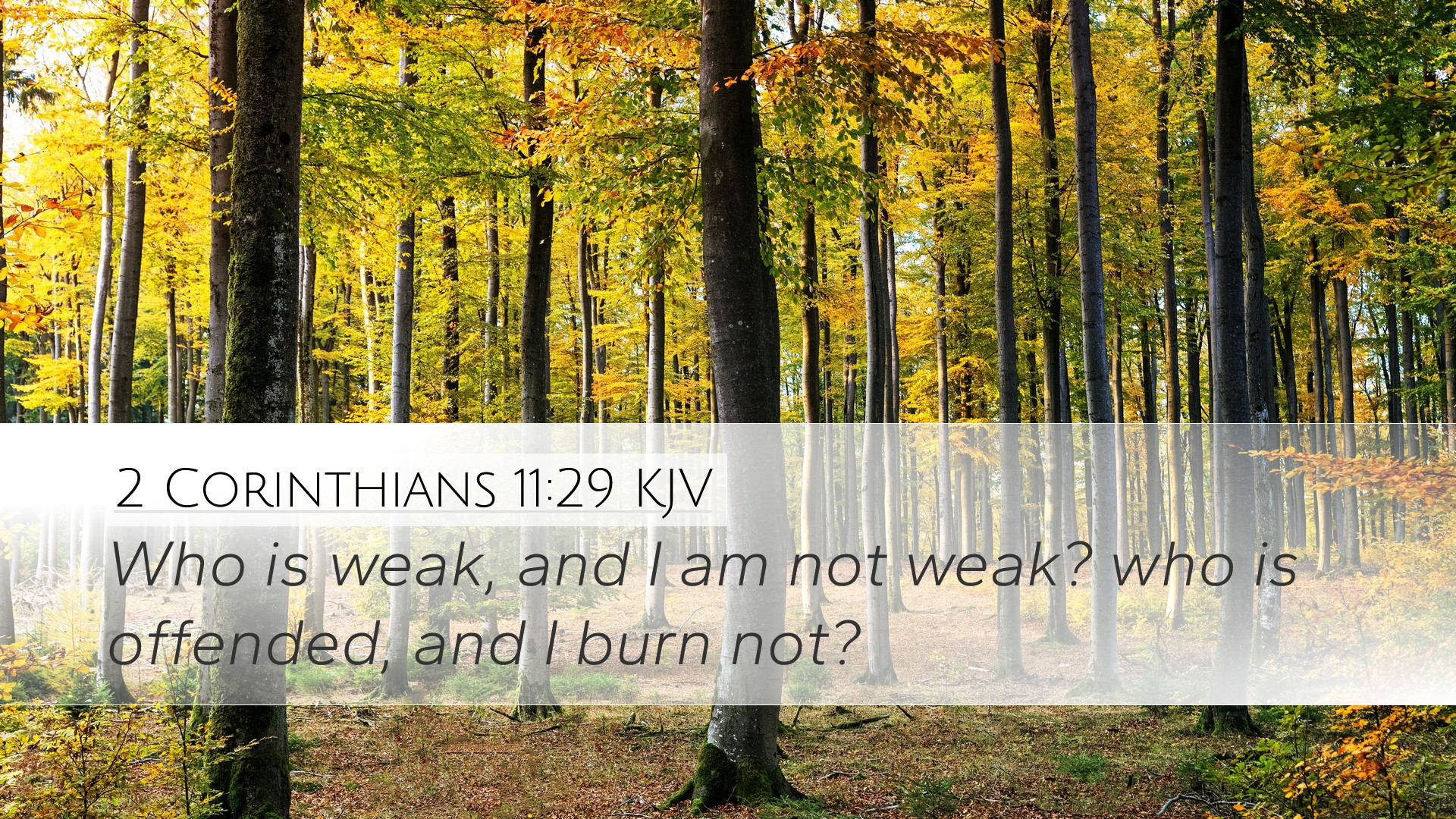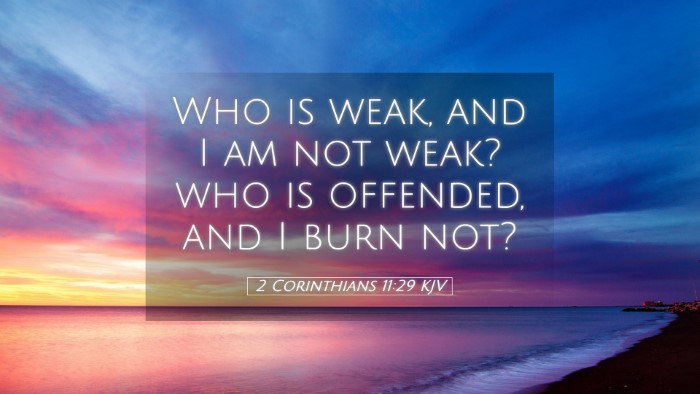Commentary on 2 Corinthians 11:29
Verse Text: "Who is weak, and I am not weak? who is offended, and I burn not?" (2 Corinthians 11:29, KJV)
Introduction
In this verse, the Apostle Paul expresses a deep connection with the sufferings and challenges faced by the Church. This passage highlights his empathetic nature and his shared experience with the vulnerabilities of believers. In the context of 2 Corinthians, Paul defends his apostleship and ministry by outlining the hardships he endures for the sake of the Gospel.
Contextual Analysis
To fully understand this verse, we must consider it within the broader context of Paul's letter to the Corinthians. The Corinthian church was facing various issues, including false teachers and moral challenges. Paul’s words here serve as both a defense of his ministry and an expression of solidarity with the sufferings of those he serves.
Common Themes
- Empathy for the Weak: Paul identifies with the weak, reflecting his pastoral concern for those who struggle in faith.
- Personal Suffering: The mention of his own burning or passion speaks to the emotional and spiritual burdens he carries.
- Corporate Identity: Paul emphasizes the connectedness of believers in Christ, reinforcing the idea that one’s suffering is felt by all in the body of Christ.
Insights from Matthew Henry
Matthew Henry comments on the emotional weight carried by Paul. He notes that the apostle's pain and concern for his brethren reveal the deep spiritual bond that exists within the Church. Henry emphasizes that true ministry is marked by a sacrificial love that identifies with the weaknesses of others. He also highlights that Paul’s reaction to the troubles of others demonstrates his own spiritual integrity and compassion.
Insights from Albert Barnes
Albert Barnes elucidates the phrase "who is weak, and I am not weak?" by interpreting it as Paul's acknowledgment of shared human frailty. He argues that every time a believer suffers, Paul experiences that sorrow with them. His perspective is that true apostleship is not only about teaching and leading but also about feeling the struggles of those one ministers to. Barnes further notes that the burning Paul refers to symbolizes a zealous concern for the spiritual welfare of others.
Insights from Adam Clarke
Adam Clarke provides a detailed commentary on Paul's rhetorical questions in this verse. He observes that these questions serve as expressions of self-identification with the sufferings of the flock. Clarke suggests that Paul uses this emotional appeal to highlight the accountability and responsibility that comes with ministry. He concludes that Paul’s anguish reveals the heart of a true servant leader who cannot remain indifferent to the trials faced by the Church.
Theological Implications
The implications of this verse stretch into various theological discussions, such as the nature of suffering, empathy in ministry, and the corporate identity of believers.
Empathy and Suffering
Paul's empathetic response to the weak reveals a Christian understanding of suffering that invites believers to care deeply for one another. It posits that a true Christian community must embody love and compassion, illustrating how each individual's pain resonates within the collective body of Christ.
Identifying with the Weak
By asking these rhetorical questions, Paul invites us to reflect on our response to the vulnerabilities of others. He challenges both leaders and church members to examine how they react to the weaknesses and offenses experienced by their peers.
The Call to Action
For pastors and church leaders, this passage serves as a poignant reminder to cultivate an awareness of the struggles of their congregation. It calls them to take action in providing support, encouragement, and understanding to those who may feel weak or offended in their faith journey.
Conclusion
2 Corinthians 11:29 encapsulates the essence of Christian ministry as embodied in the Apostle Paul. His solidarity with the weak and offended reflects a profound theological truth about the nature of the Church: we are one body, and when one suffers, we all feel that suffering. As we meditate on these words, may we be inspired to nurture an empathetic, supportive environment within our communities that mirrors Paul's heart for the Church.


